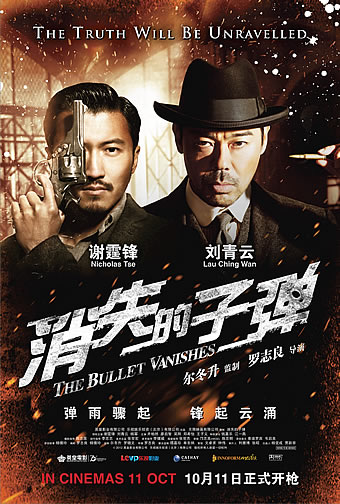THE VANISHED MURDERER (消失的凶手) (2015)
Genre: Thriller/Action
Director: Lo Chi-leung
Cast: Sean Lau Ching-wan, Gordon Lam, Jacqueline Li Xiaolu, Jiang Yiyan, Guo Xiaodong, Rhydian Vaughan
Runtime: 2 hrs 1 min
Rating: PG13 (Some Violence)
Released By: mm2 Entertainment, Clover Films and Shaw
Official Website:
Opening Day: 10 December 2015
Synopsis: A women’s prison in the Northern China in 1932, Prisoner FU Yuan (JIANG Yiyan) digs a tunnel in her prison cell with a silver spoon and escapes. Inspector SONG Donglu (LAU Ching-wan) is summoned to investigate FU’s escape. By tracking down the letters sent to him by FU, it sets SONG off to Hong City to unravel FU’s disappearance.
Hong City is enduring several years of economic recession and citizens are struggling to live. GAO (GUO Xiaodong), the business magnate of the city, has corrupted the government officials, monopolized the whole industrial business and treated the labors harshly. Students have deployed to protest against the situation. At one point, it follows with relentless suicidal incidents of labors jumping off buildings. Their clothing is blood stained with words of accusing GAO’s cruelty. SONG starts to suspect the suicides as he has witnessed one of the suicidal actions. When SONG is digging into the cases, university professor HUO (LAM Ka-tung) tells SONG that FU had published a set of ciphers as a game in his newspaper half year ago and the subject of ciphers is related to these bizarre suicidal incidents.
SONG is gradually unveiling the plot of riddles, and yet, the truth is inevitably covered up by more red herrings, peculiar murders and gun battles…If FU is ruled out as the suspect, who is the culprit behind the serial killings?
Movie Review:
Everyone loves a quick-witted but eccentric detective at the heart of an intriguing mystery, especially one with supernatural undertones that is subsequently resolved by good old logical deduction. That was the hook of Lo Chi-leung’s ‘The Bullet Vanishes’ three years ago, which saw Inspector Song Donglu (Lau Ching Wan) try to crack a string of deaths in which the bullets which caused them mysteriously vanished thereafter. Besides a gripping story, Lo’s critical and commercial hit also boasted the engaging chemistry of Lau and Nicholas Tse, the latter of whom played a sharp-shooting local detective that turned out to be the mastermind behind the killings.
There is good reason why Tse doesn’t return for this sequel, which finds Inspector Song once again at the centre of a perplexing whodunit, this time centred around a string of unnatural suicides in which each one of the victims blame the corrupt business magnate Gao Minxiong (Guo Xiaodong) for their fates. Naturally, there is more than meets the eye, and Song’s investigation reveals links to the fomenting tensions between the business owners led by Gao and the oppressed working class, as well as an impending student revolution led by university professor Huo (Lam Ka-Tung) against Gao.
But whereas its predecessor kept you guessing just who was responsible, there is hardly any surprise this time round. Indeed, right from the character’s introduction early on where he uses the example of sacrificing one innocent life to protect five others in order to illustrate his concept of social justice, we are under no illusions that this certain individual will eventually be unveiled as the mastermind. Without that element of surprise, the only answer that we are left waiting for is why – and boy oh boy, is it one long, draggy, ponderous wait just to get to that point.
To get to the bottom of the case, Song goes on a wild goose chase within the fictional Hong City, teaming up occasionally with a local sergeant (Rhydian Vaughan) and with an ex-fiancée (Li Xiaolu) whom we learn he had unceremoniously dumped at the altar some years ago in tow. Unfortunately, neither quite justify their own existence in the movie, whether by themselves or as a supporting act to Song the way Tse’s police captain was in the first movie. And oh, speaking of its predecessor, the husband killer Fu Yuan (Jiang Yiyan) whom Song had put behind bars in the first movie escapes in this film’s opening minutes, and not only becomes the excuse to bring Song to Hong City but also turns up now and then to tease a possible romantic attraction.
With Lo performing just directorial duties this time round, returning screenwriter Yeung Sin-ling seems at a loss how to develop a compelling narrative around these characters and the bourgeoisie-proletariat conflict surrounding them. Instead, she lets Song do a lot of talking that often adds up to very little, and places the other characters in a revolving door to take turns trading exposition after lengthy exposition with Song. A sub-plot involving Gao and his son whose incompetence threatens to unravel his whole operation is equally underdeveloped, and so are the themes of courage amidst oppression and the torment of regret that are supposed to be the film’s emotional anchors.
If it isn’t yet clear enough, those expecting an action-packed thriller like the trailers seem to promise will be in for a huge disappointment, as the two sequences you see – the first with Song riding horseback through the city and the second with Song on a runaway train which will eventually derail – are just about the only action that you will get in the two hours here. Lo takes a playful tone with the former as Song tries to evade Gao’s henchmen while remaining on horseback through the rooms of a hospital, but the levity seems out of place in a movie that otherwise seems content to take itself deadly seriously. On the other hand, the finale is an impressive blend of live-action and CGI by Chinese moviemaking standards, but is otherwise a shameless rip-off from Guy Ritchie’s ‘Sherlock Holmes: A Game of Shadows’ and nothing we haven’t yet seen before from Hollywood.
Of course, from Song’s brilliant powers of deduction right down to the bromance between Lau and Tse, it is no secret that ‘The Bullet Vanishes’ was meant to be a ‘Sherlock Holmes’ equivalent. Yet, while Lau succeeded in making Song a character of its own standing in the earlier movie, he is ultimately undone here by poor characterisation and bad plotting. Gone are his skills as a keen forensic investigator and an expert in criminal psychology; rather, Song is defined here mainly by his penchant for conversation and his preference not to engage in matters of the heart. Lau is no stranger to the quirky, oddball detective act, but even he struggles to convince us why his character is worth his salt.
Like we said at the beginning, everyone loves a quick-witted but eccentric detective at the heart of an intriguing mystery, but sadly, ‘The Vanished Murderer’ offers none. There is too little wit about Inspector Song, and not much of intrigue in this open-and-shut case. Like its title, this sequel tries to replicate elements of its predecessor with little success – unless a murderer stays behind at the scene of his crime, what the heck does a vanished murderer mean anyways? The bigger mystery is why these original players would sign up for something which only sullies the name of their good work in the past, and if there’s one thing we’re sure of, it is that they are probably hoping this ignominy vanishes not a second too quickly.
Movie Rating:



(An utterly disappointing follow-up to the gripping period detective thriller ‘The Bullet Vanishes’, this inexplicably titled sequel is heavy on exposition and light on everything else including plot, character, tension or action)
Review by Gabriel Chong
You might also like:





